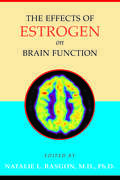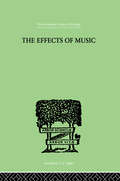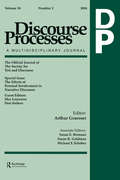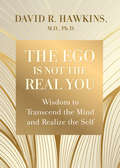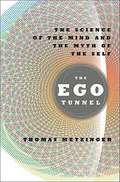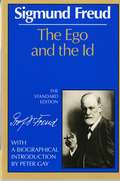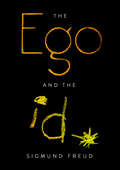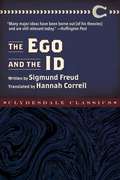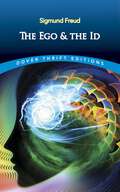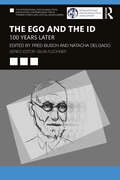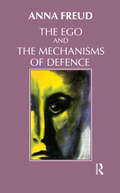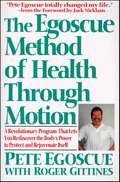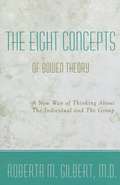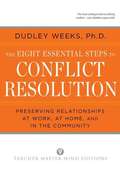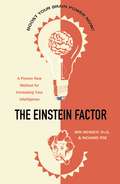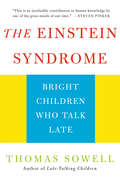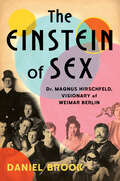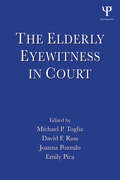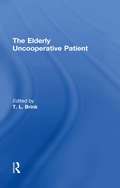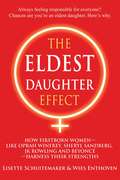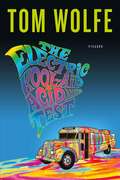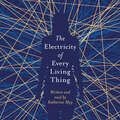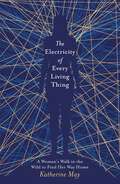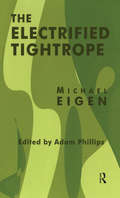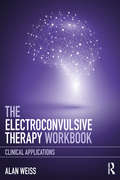- Table View
- List View
The Effects of Estrogen on Brain Function
by Natalie L RasgonThis timely volume reviews current data on the effects of estrogen on the central nervous system, highlighting clinical aspects of this topic. Experts from the fields of psychiatry, pharmacology, neurology, and geriatrics collaborate to clarify the known risks and benefits of hormone therapy and explore questions that remain to be elucidated.Among the topics discussed:" Preclinical data on estrogen's effects on cognitive performance" The short-lived effects of hormone replacement therapy on cognitive function" Structural and functional brain imaging data regardingestrogen's effects on the central nervous system " Preclinical efforts to develop effective NeuroSERMs for the brain " The effects of estrogen on moodCiting the ongoing confusion over the risks and benefits of estrogen therapy, the contributors emphasize the need for additional research on medication, doses, preparations, methods of administration, alternative therapies, and supplements. This volume educates researchers, clinicians, and students on the current knowledge—including the effects of estrogen on mood, cognition, and brain metabolism—and provides guidelines for clinical practice and future research.Contributors: Roberta Diaz Brinton, Ph.D., University of Southern California; Cheri L. Geist, B.A., David Geffen School of Medicine, University of California at Los Angeles; Robert B. Gibbs, Ph.D., University of Pittsburgh School of Pharmacy; Eva Hogervorst, Ph.D., University of Loughborough and University of Oxford; Pauline M. Maki, Ph.D., Neuropsychiatric Institute, University of Illinois–Chicago; Peter J. Schmidt, M.D., National Institute of Mental Health; Daniel H. S. Silverman, M.D., Ph.D., David Geffen School of Medicine, University of California at Los Angeles; Katherine E. Williams, M.D., Stanford University School of Medicine; Kristine Yaffe, M.D., University of California, San Francisco, and San Francisco VA Medical Center; Laurel N. Zappert, B.A., Stanford University School of Medicine; Liqin Zhao, Ph.D., University of Southern California
The Effects of Music: A series of Essays (International Library Of Psychology Ser.)
by Max SchoenThis is Volume XVIII of twenty-one of collection of works on Cognitive Psychology. Initially published in 1927 it offers a collection of essays on the effects of music on the listerner.The book is at once a response and a challenge. It is a response to the inquiry which any thoughtful listener makes, “ What is this music doing to me ? ” A t the same time it is a challenge to science to explain more adequately than has as yet been done the nature and the mysteries of musical effects.
The Effects of Personal Involvement in Narrative Discourse: A Special Issue of Discourse Processes
by Arthur GrasserOver the last several decades, the study of discourse processes has moved from the complementary efforts characteristic of multidisciplinary research, to the explicitly integrative focus of interdisciplinary research. Some organizations have supported the methodological and conceptual merger of areas like literary studies, psychology, linguistics, and education. As evident in this special issue, research concerning personal involvement in narrative discourse has benefited from these developments. The five studies supported in this issue examine a range of potential determinants of personal involvement in narrative discourse. These include overt verbalization of thoughts and feelings, foregrounding, preference for genre and protagonists, relevance of the content of a text to the reader, and identifying with a character. These studies also examine different aspects of what is absorbed by the reader, including sophisticated forms of questioning, lasting appreciation of story points, involvement with story characters, commitment to story-consistent beliefs, and changes in the sense of self. Collectively, these studies challenge the conception of what it means to understand media presentations of fictional narratives as well as the conception of the strategies through which such understanding is attained.
The Ego Is Not the Real You: Wisdom to Transcend the Mind and Realize the Self
by David R. HawkinsLearn to let go of the illusions of the ego and discover the real you with this collection of inspiring quotes on the ego, mind, and spiritual enlightenment from human-consciousness expert Dr. David R. Hawkins.Are you willing to let go of seeing yourself as the ego believes you to be? Are you willing to go further, to know that the ego itself is an illusion? In this book, select teachings from Dr. David R. Hawkins&’s extensive body of work will guide you in the process of realization, surrender, and transformation. When we let go of the old ways of thinking, our attachments, and the false promises of the ego, we discover the truth that we are one with All.Features classic passages, including: • It is not really necessary to subdue the ego, but merely to stop identifying with it. • Every life experience, no matter how &“tragic,&” contains a hidden lesson. When we discover and acknowledge the hidden gift that is there, a healing takes place. • Enlightenment is not a condition to be obtained; it is merely a certainty to be surrendered to, for the Self is already one&’s Reality. It is the Self that is attracting one to spiritual information. • To be enlightened merely means that consciousness has realized its most inner, innate quality as nonlinear subjectivity and its capacity for awareness. • The only energy that has more power than the strength of the collective ego is that of Spiritual Truth. &“This book is small in size, but it can have a massive impact on your life. It will take you through the process of a total transformation of consciousness—if you choose to apply its teachings deeply within yourself.&” — From the Introduction by Fran Grace, Ph.D.
The Ego Tunnel: The Science of the Mind and the Myth of the Self
by Thomas MetzingerWe're used to thinking about the self as an independent entity, something that we either have or are. In The Ego Tunnel, philosopher Thomas Metzinger claims otherwise: No such thing as a self exists. The conscious self is the content of a model created by our brainpan internal image, but one we cannot experiences image. Everything we experience is "a virtual self in a virtual reality." But if the self is not "real," why and how did it evolve? How does the brain construct it? Do we still have souls, free will, personal autonomy, or moral accountability? In a time when the science of cognition is becoming as controversial as evolution, The Ego Tunnel provides a stunningly original take on the mystery of the mind.
The Ego and the Id (Complete Psychological Works Of Sigmund Freud Ser. #0)
by Sigmund FreudIn this seminal work of personality psychology, Austrian psychiatrist Sigmund Freud explains the dynamic of the human psyche with respect to the roles and conflicts produced by the id (the hidden source of human passion), ego (formed to negotiate the id's interactions with reality), and super-ego (the cricitcal, moralistic part of the mind); the latter two which remain in constant conflict with the id's demands. Freud further explores the concepts of the life force and the death force, and the anxieties driven by fear, morality, and guilt. This groundbreaking volume constitutes one of the Viennese physician's most insightful works on the topic. Penguin Random House Canada is proud to bring you classic works of literature and nonfiction in e-book form, with the highest quality production values. Find more today and rediscover books you never knew you loved.
The Ego and the Id (Complete Psychological Works Of Sigmund Freud Ser. #0)
by Sigmund Freud“Many major ideas have been borne out [of his theories] and are still relevant today.” —Huffington Post One of famed psychoanalyst Sigmund Freud’s most prominent ideas was that of the id, the ego, and the super-ego—the three main factors behind the workings of the human mind. Freud claimed these components of the human psyche controlled all processes of personality, behaviors, and traits in a person. The Id was a person’s most basic and impulsive instincts—the ones that feed into our deepest desires and physical needs. The Super-Ego was the opposite of the id. This component controlled our highest morals and standards, operating through our conscience and making us desire to be our most ideal-selves. The piece in the middle is the Ego. The ego mediates between the id and realities of the world around us, while being supervised (and guilted) by the super-ego. In this new edition of his book, The Ego and the Id, Sigmund Freud delves deeper into the concepts of the human mind and the results of the conflicts and workings between them.
The Ego and the Id (Dover Thrift Editions #0)
by Sigmund FreudAll human behaviors and traits, according to this 1923 study, derive from the complicated interactions of three elements of the psyche: the id, the ego, and the superego. The root of Sigmund Freud's approach to psychiatric treatment resides in bringing the id, the hidden source of human passion, to the surface. The ego — formed to negotiate the id's interactions with reality — and the superego — the critical, moralistic part of the mind — remain in constant conflict with the id's demands. Although the concept of the unconscious was not Freud's own invention, he brought it into popular awareness and pioneered its use in treating mental conditions. This groundbreaking volume constitutes one of the Viennese physician's most insightful works on the topic. In addition to positing the balancing act between the id, ego, and superego, Freud further explores the concepts of the life force and the death force, and the anxieties driven by fear, morality, and guilt.
The Ego and the Id: 100 Years Later (The\international Psychoanalytical Association Contemporary Freud Turning Points And Critical Issues Ser.)
by Fred Busch Natacha DelgadoThe Ego and the Id: 100 Years Later revisits Freud’s classic 1923 essay, which developed key psychoanalytic concepts and presented a radical revision of his earlier theory. International contributors explore the themes of this remarkable work from their own perspective, with novel and surprising results. There are mysteries uncovered, questions raised about the validity of Freud’s perspective, problems in psychoanalytic technique based on those clinging to Freud’s earlier model of the curative process in psychoanalysis, cybernetics as a way of evaluating Freud’s model, and many other gems. With contributors highlighting the significance of the essay and offering critiques based upon new understanding gathered over the last century, The Ego and the Id: 100 Years Later offers a fresh, international perspective on this classic paper. This book will be essential reading for psychoanalysts in practice and in training and of great interest to scholars of psychoanalytic studies.
The Ego and the Mechanisms of Defence (International Psycho-analysis Library)
by Anna Freud The Institute of PsychoanalysisThis book deals with one particular problem that is with the ways and means by which the ego wards off unpleasure and anxiety, and exercises control over impulsive behavior, affects, and instinctive urges. It is a major contribution to psychoanalytic psychology.
The Egoscue Method of Health Through Motion: A Revolutionary Program That Lets You Rediscover the Body's Power to Protect and Rejuvenate Itself
by Pete Egoscue Roger GittinesNo one is immune. For people from champion athletes to desk-bound white-collar professionals, many simple acts of life--a relaxing evening stroll through the neighborhood, an exhilarating run along a sandy beach, just bending down to tie a loose shoelace-are often acts of torture. The walking wounded suffer from torn rotator cuffs, tennis elbow, jogger's knees, bad backs, stiff necks, sore feet, and swollen ankles. It could, without exaggeration, be called a modem epidemic. In this brilliant book, renowned anatomical functionalist Pete Egoscue identifies the epidemic's causes and effects. By recognizing that the human body is dependent on adequate motion to maintain its full range of physical functions, he has revolutionized both the treatment of musculoskeletal pain and the techniques for training athletes to achieve peak performance levels. Brimming with common sense and practical advice, the heart of this important book consists of twenty-two easy-to-do, highly effective exercises that stretch, strengthen, and relax the body, allowing a return to proper alignment.
The Eight Concepts Of Bowen Theory: A New Way Of Thinking About The Individual And The Group
by Roberta M. Gilbert"The Eight Concepts" is a clear and concise description of the basic concepts of Bowen family system theory. Beginning with the fundamental concept of the nuclear family as the emotional unit, the other concepts -- differentiation of self scale, triangles, cutoff, family projection process, multigenerational transmission process, sibling position, and emotional processes of society -- are explained as they evolve out of the fundamental concept of the emotional unit.
The Eight Essential Steps to Conflict Resolution: Preserving Relationships at Work, at Home, and in the Community
by Dudley WeeksProblems that "just won't go away" can be settled through methods developed by one of America's leading experts in conflict resolution. In clear language, Weeks shows readers how to turn conflict into lasting partnerships and ensure a fruitful outcome.
The Einstein Factor: A Proven New Method for Increasing Your Intelligence
by Richard Poe Win Wenger"The Einstein Factor liberates mental abilities you didn’t know you had. I tried the techniques in the book and they paid off instantly. It’s almost scary."—Duncan Maxwell Anderson, senior editor, Success.New research suggests that the superior achievements of famous thinkers may have been more the result of mental conditioning than genetic superiority. Now you can learn to condition your mind in the same way and improve your performance in virtually all aspects of mental ability, including memory, quickness, IQ, and learning capacity. Intelligence pioneer Dr. Win Wenger has identified the tools you need to reach greater levels of sharpness, insight, and overall intelligence. Using Wenger’s Image Streaming technique, you learn to bypass inhibitions and access the hypernormal capabilities hidden in your own subconscious. Discover how you can: ·Improve your memory ·Read faster and learn more quickly ·Solve problems like a genius ·Score higher on tests ·Build self-esteem ·Induce a state of total creative absorption ·Access powerful subconscious insights through visualization ·Increase your intelligence The Einstein Factor is your key to living an extraordinarily effective and creative life!
The Einstein Syndrome: Bright Children Who Talk Late
by Thomas SowellThe Einstein Syndrome is a follow-up to Late-Talking Children, which established Thomas Sowell as a leading spokesman on the subject of late-talking children. While many children who talk late suffer from developmental disorders or autism, there is a certain well-defined group who are developmentally normal or even quite bright, yet who may go past their fourth birthday before beginning to talk. These children are often misdiagnosed as autistic or retarded, a mistake that is doubly hard on parents who must first worry about their apparently handicapped children and then see them lumped into special classes and therapy groups where all the other children are clearly very different. Since he first became involved in this issue in the mid-90s, Sowell has joined with Stephen Camarata of Vanderbilt University, who has conducted a much broader, more rigorous study of this phenomenon than the anecdotes reported in Late-Talking Children. Sowell can now identify a particular syndrome, a cluster of common symptoms and family characteristics, that differentiates these late-talking children from others; relate this syndrome to other syndromes; speculate about its causes; and describe how children with this syndrome are likely to develop.
The Einstein of Sex: Dr. Magnus Hirschfeld, Visionary of Weimar Berlin
by Daniel BrookAn illuminating portrait of a lost thinker, German-Jewish sexologist and activist Magnus Hirschfeld. More than a century ago, Dr. Magnus Hirschfeld, dubbed the “Einstein of Sex,” grew famous (and infamous) for his liberating theory of sexual relativity. Today, he’s been largely forgotten. Journalist Daniel Brook retraces Hirschfeld’s rollicking life and reinvigorates his legacy, recovering one of the great visionaries of the twentieth century. In an era when gay sex was a crime and gender roles rigid, Hirschfeld taught that each of us is their own unique mixture of masculinity and femininity. Through his public advocacy for gay rights and his private counseling of patients toward self-acceptance, he became the intellectual impresario of Berlin’s cabaret scene and helped turn his hometown into the world’s queer capital. But he also enraged the Nazis, who ransacked his Institute for Sexual Science and burned his books Driven from his homeland, Hirschfeld traveled to America, Asia, and the Middle East to research sexuality on a global scale. Through his harrowing lived experience of antisemitic persecution and a pivotal late-in-life interracial romance, he came to see that race, like gender, was a human invention. Hirschfeld spent his final years in exile trying to warn the world of the genocidal dangers of racism. Rich in passion and intellect, The Einstein of Sex at last brings together this unsung icon’s work on sexuality, gender, and race and recovers the visionary who first saw beyond the binaries. A century after his groundbreaking work—as the fights for personal freedom and societal acceptance rage on—Hirschfeld’s gift for thinking beyond the confines of his world has much to teach us
The Elderly Eyewitness in Court
by Edited by Michael P. Toglia, David F. Ross, Joanna Pozzulo, and Emily PicaThe majority of research on eyewitness memory has traditionally studied children and young adults. By contrast, this volume is designed to provide an overview of empirical research on the cognitive, social, and health related factors that impact the accuracy of eyewitness testimony given by the elderly. The book takes a lifespan developmental perspective that incorporates research on witnesses of all ages, but uses the findings to focus on issues unique to the elderly. This includes research on recognition memory with lineup identifications and recall memory that occurs when an elderly witness is asked to describe an event in court. The Elderly Eyewitness also examines jurors’ reactions to the testimony of an elderly witness, and the legal and social policy issues that emerge when the elderly witness participate in legal proceedings. While reviewing what is known about the elderly witness, the book also provides a direction for future research into this new frontier of scientific inquiry. Its audience spans researchers in cognitive and developmental psychology, and professionals working in the growing area of psychology and law.
The Elderly Uncooperative Patient
by T.L. BrinkAn invaluable resource for the mental health professional who must deal with the uncooperative and difficult elderly patient.
The Eldest Daughter Effect: How First Born Women – like Oprah Winfrey, Sheryl Sandberg, JK Rowling and Beyoncé – Harness their Strengths
by Lisette Schuitemaker Wies Enthoven"What do Angela Merkel, Hillary Rodham Clinton, Christine Lagarde, Oprah Winfrey, Sheryl Sandberg, JK Rowling and Beyoncé have in common?" was the headline in the English newspaper The Observer in 2014. "Other than riding high in Forbes list of the world’s most powerful women," journalist Tracy McVeigh wrote in answer to her own question, "they are also all firstborn children in their families. Firstborn children really do excel." So what does it mean to be an eldest daughter? Firstborns Lisette Schuitemaker and Wies Enthoven set out to discover the big five qualities that characterize all eldest daughters to some degree. Eldest daughters are responsible, dutiful, thoughtful, expeditious and caring. Firstborns are more intelligent than their siblings, more proficient verbally and more motivated to perform. Yet at the same time they seriously doubt that they are good enough. Being an eldest daughter can have certain advantages, but the overbearing sense of responsibility often gets in the way. Parents may worry about their ‘difficult’ eldest girl who wants to be perfect in everything she does whilst her siblings may not always understand her. "The Eldest Daughter Effect" shows how firstborn girls become who they are and offers insights that can give them more freedom to move. And parents will gain a better understanding of their firstborn children and can support them more fully on their way.
The Electric Kool-Aid Acid Test
by Tom WolfeWolfe takes a walk on the wild side with Ken Kesey and his Merry Pranksters and writes about the 1960s hippie culture.
The Electricity of Every Living Thing: A Woman's Walk in the Wild to Find Her Way Home
by Katherine MayLast summer, Katherine May was approaching 40, feeling overwhelmed by motherhood and lacking connection with others, lost in a world of inundation and expectation. She had always felt different but this feeling was new. She wanted to get out, get free and find herself again - and so set about walking the rugged 450 mile South West Coast Path. However, this journey uncovers more than she ever imagined. By chance, en route to the walk, Katherine hears a radio show and the guests are speaking about Asperger's Syndrome. Things begin to fall into place - could this explain the white-outs, the excruciating confusion around social contact, the electric feeling of every living thing?After a formal diagnosis, Katherine begins to unravel this new perspective of her life. Through her physical journey comes an emotional one - of accepting who she is and moving forward. It's not just about walking or Asperger's; this is one woman's journey to feel free within herself, something that everyone can relate to.Read by Nathalie Buscombe(p) Orion Publishing Group 2018
The Electricity of Every Living Thing: From the bestselling author of Wintering
by Katherine MayFrom the bestselling author of Wintering, Katherine May, The Electricity of Every Living Thing is a life-affirming and poignant exploration of nature, and how reconnecting to wild landscapes can create peace in our unquiet minds.'A windswept tale, beautifully told' Raynor Winn, author of The Salt Path 'A manifesto for the value of difficult people. I loved it' Amy Liptrot, author of The OutrunIn August 2015, Katherine May set out to walk the 630-mile South West Coast Path. She wanted to understand why she had stopped coping with everyday life; why motherhood had been so overwhelming and isolating, and why the world felt full of inundation and expectations she can't meet. Setting her feet down on the rugged and difficult path by the sea, the answer begins to unfold.The Electricity of Every Living Thing tells the story of the year in which Katherine comes to terms with a diagnosis which shakes her to her core. It leads to a re-evaluation of her life so far - a kinder one, which finally allows her to be different rather than simply awkward, arrogant or unfeeling. The physical and psychological journeys become inextricably entwined, and as Katherine finds her way across the untameable coast, she also finds the way to herself.What readers are saying about The Electricity of Every Living Thing:'Honest and sensitive' 'The astonishing sensitivity and awareness in her writing, both about the beautiful landscapes and nature around on her walks, and in relation to her family, friends and self put paid to many outdated myths about what it is like to be autistic''Compelling and transformative. I could not put this book down so I stayed in bed and read it in one go.''Katherine has a fantastic way with words, I could read her books for hours on end, they are calming and relatable.''Read it - you won't regret it.'
The Electrified Tightrope
by Michael EigenThis book examines the tension, caused by the conflict between poise and catastrophe, in the therapeutic relationship. It emphasizes positive contributions to growth of self made by seemingly pathological or disruptive movements within the therapy situation.
The Electroconvulsive Therapy Workbook: Clinical Applications
by Alan WeissElectroconvulsive Therapy (ECT) remains one of the most effective forms of neurostimulation for severe mental illness. Sound scientific research underpins contemporary practice challenging the complex history and stigma that surround this treatment. The Electroconvulsive Therapy Workbook integrates the history of ECT with major advances in practice, including ultrabrief ECT, in a hands-on workbook format. Novel forms of neurostimulation are reviewed, highlighting the future directions of practice in this exciting area. The book is also richly illustrated with historical and technical images and includes ‘clinical wisdom’ sections that provide the reader with clinical insights into ECT practice. Online eResources are also available, featuring a wide range of questions and answers related to each chapter to help test and consolidate readers’ understanding of ECT, as well as regionally specific legislation governing ECT practice in Australia and New Zealand. This comprehensive introduction to ECT is a must-read for doctors in training, psychiatrists who require credentialing in this procedure, anaesthetists, nursing staff who work in ECT and other professionals who have an interest in ECT as well as consumer and carer networks.
